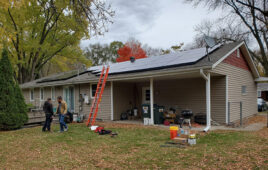The Arizona Corporation Commission on Jan. 26 voted against adopting proposed Energy Rules that would have required the state’s electric utilities to reduce their carbon emissions to combat climate change and pave the way for 100% clean energy for the state. The 3-to-2 vote came after months of a supplemental rulemaking process that followed the commission’s approval last May of the update that would have set emission standards for Arizona utilities.
“We hope the Arizona Corporation Commission’s rejection of these rules is not the final word on reducing Arizona electric utilities’ greenhouse gas emissions and moving Arizona to a clean energy future,” said Adam Stafford, Western Resource Advocates’ senior staff attorney in Phoenix. “The commission must regroup and develop a new path forward that allows Arizona to address the current climate crisis. The power sector provides some of the most cost-effective opportunities to reduce climate pollution. Arizona’s largest utilities have all said they want the regulatory certainty of a firm emissions reduction standard, and the business community has voiced support for that, as well. Our state needs strong standards for reducing the emissions that cause climate change and realizing the economic benefits of clean energy.”
The commissioners who voted against adoption largely attributed their decision to avoiding higher energy rates.
“When I ran for the Commission, I promised to pursue policies that will lead to the lowest rates possible while still maintaining safe and reliable services. I have sought to honor this pledge with each of my votes at the Commission and today’s vote was no exception. I proudly voted to respect the will of the voters and to protect the ratepayers from unwanted rate increases,” said Commissioner Justin Olson (R).
Commissioner Sandra Kennedy (D) expressed her disappointment in a statement after the vote.
“This is a sad day for Arizona. This vote is one of the worst that has occurred at the Commission in recent memory, and represents a sad turn against clean energy, energy efficiency, and smart grid solutions from three of my fellow Commissioners,” Kennedy said.





I would like to start out that John Oliver did a great segment on utilities and should be watched on You Tube. Electric utilities are for profit monopolys and must be regulated by the ACC fortunately solar is cheap ( Ref LCOE ),and utilities want to transition to it especially in AZ however they do not want to pay for it, that’s they feel is the ratepayers job. The longer we put off this transition. the more it is going to cost. I have roof top solar and a very efficient 1250sft home which makes more power than it uses, It cost me about 25k total 17K for the solar and 8 for new high efficient HVAC , water heater and appliances . and I still pay TEP about 360.00 a year to be grid tied.
I hope the voter pay attention to the ACC and realize that true leadership is required if they want real change in the system with lower rates and cleaner power, because if I can do this at average of 130$ a month over a 20 year period on a small scale , then the utilities should be able to do it at a much lower cost for the consumer on a large scale.
Please pay attention and Vote.
This has been circulating for over a decade now. The electric utility companies have 10, 25, 50-year plans already laid out. The 10-year plans are the most likely. APS, TEV could go with their 10-year plans and install more solar PV, while going back to retrofit several solar PV projects with large energy storage systems to time shift and dispatch energy later in the day, into night. The NGS coal fired plant in Northern Arizona decommissioned in 2019 about 8 to 10 years sooner than projected. The four corners coal fired plant is still on track to decommission in 2025. Utility SRP which is not directly under the ACC because it is not an IOU utility has its own plan of action, so far it has been following APS and TEV for future upgrades. In Arizona the IOU utilities don’t seem resistant to decarbonization. The sticking point is how much the ratepayers should be paying with electricity rate increases. The last electricity rate increase was 5.3% when all hell broke loose from the ratepayers. A more intrusive aspect is the Legislature wants the “last word” and could pass a law that can overturn the ACC rulings.